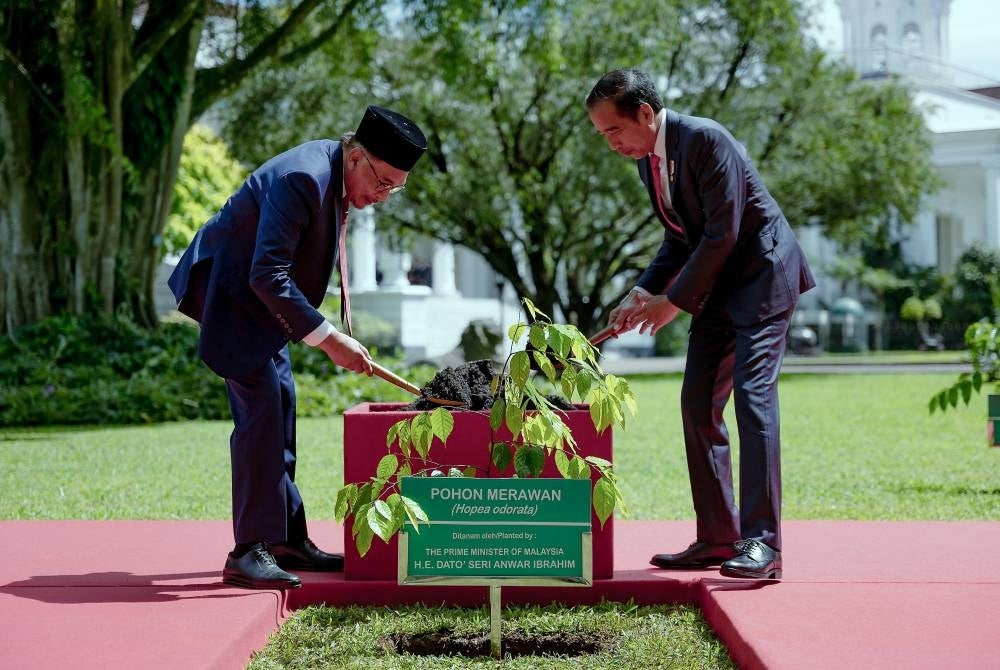Earlier this week, Malaysia’s Prime Minister Anwar Ibrahim concluded his two-day working visit to Indonesia.
In hindsight, as the practice of other leaders before, an inaugural visit to Indonesia is a matter of diplomatic tradition.
But to Malaysian Premier Anwar Ibrahim, the recent visit signifies a special diplomatic meaning.
For one, the visit is more personal to the Prime Minister. Even Indonesia is regarded as Prime Minister Anwar’s second home.
Then, many of Prime Minister Anwar’s friends, including former president BJ Habibie, senior politicians, and activists, poured unconditional support and consolation when Anwar Ibrahim was in his political wilderness.
Fast forward, in the words of President Joko "Jokowi” Widodo, "I am personally honored that Indonesia is the first stop.”
Indeed, this was manifested through the high-level gesture the Indonesians accorded to the Prime Minister.
It is an open secret that leaders visited Istana Bogor, the presidential palace bears diplomatic weightage, which indicates the strong bilateral relations.
Prime Minister Anwar and his counterpart President Jokowi were also engaged in the Veranda Talk, a tête-à-tête between the President and the guest honor, who is considered close and important in terms of bilateral ties.
Even at the public lecture entitled "Malaysia-Indonesia Strategic Relations,” organised by an Indonesian private company, the crowd’s vibes were attentive to the Prime Minister.
The crowd looked up and sought the Prime Minister’s point of view on regional and international issues that are invariably considered challenging.
Economically, the ties between the two neighboring countries are also expected to be further boosted as the visit saw Malaysia’s expression of interest in participating in the Nusantara development, Indonesia’s new capital, also known as Ibu Kota Negara (IKN).
To date, eleven letters of intent from Malaysian companies to participate in the Nusantara development were handed over to the Head of Nusantara Capital Authority. At the same time, nine Memorandum of Understanding (MoU) were exchanged, worth RM1.66 billion.
But beyond this, two issues will likely be the defining features that will see Malaysia and Indonesia working closer than before.
Firstly, both countries should close rank and work together in increasing cooperation to develop the palm oil market, given the European Union (EU)’s plan to phase out the commodity export over deforestation concerns.
Statistically, Malaysia and Indonesia account for approximately 85 per cent of the world’s palm oil exports, with Indonesia producing 46 million tons of crude palm oil and making it the world’s largest producer, followed by Malaysia with 18 million tons.
In December 2022, the EU aimed to phase out the import of unsustainable palm-oil fuels by 2030, citing contributions to deforestation and forest degradation concerns and sustainability issues.
Malaysia and Indonesia then filed complaints to the World Trade Organisation (WTO), awaiting the result, which was supposed to come out late last year.
The file was made due to the loggerheads with the EU, over the latter’s trade barriers and protectionist measures for the bloc’s domestic oilseed industries.
For a start, authorities from both countries could increase their cooperation based on the momentum laid by Prime Minister Anwar and President Jokowi.
In the latter's words, "We agreed to strengthen cooperation through the Council of Palm Oil Producing Countries (CPOPC) to increase the palm oil market and fight palm oil discrimination.”
To be sure, the CPOPC, currently headquartered in Jakarta, has been mainly pursuing collaborative efforts to promote palm oil’s sustainability.
This is where both Malaysia and Indonesia could work more closely together, and acts as the complementary towards measures against any discrimination at the WTO.
Secondly, more united in both voices and actions between Malaysia and Indonesia regarding the crisis in Myanmar.
As 2023 gears in, Indonesia is now the chair of the Association of Southeast Asian Nations (ASEAN). Indeed, Myanmar’s quagmire topped the regional body's agenda, and Malaysia remains committed to supporting Indonesia's chairmanship and the 5 Points of Consensus (5PC).
The 5PC, which is a peace plan designated by the bloc in April 2021, calls for an immediate cessation of violence, inclusive peace dialogue with all stakeholders, unimpeded delivery of humanitarian aid, and a visit by the Asean special envoy to Myanmar.
As a matter of fact, it is recently announced that the Indonesian foreign minister Ibu Retno Marsudi will head the special envoy office to spearhead how Asean addresses the crisis in Myanmar.
In her earliest statement, the special envoy will seek to engage with "all stakeholders” in Myanmar, which invariably alludes to the inclusion of Aung San Suu Kyi, though it will be much chagrin to Myanmar’s military.
Indeed, Malaysia will join forces with Indonesia in seeking a constructive solution, to which the Tatmadaw, as Myanmar’s military is infamously known, must be persuaded to implement the 5PC immediately in a meaningful way.
The onus is on Myanmar if it fails to heed Asean’s advice, invariably under Indonesia’s chair. If the calls are mounting to pressure Myanmar to leave the regional bloc temporarily, it is because Asean’s patience is wearing thin.
Indeed, Prime Minister Anwar’s recent visit to Indonesia has offered a timely opportunity for both countries to strengthen their ties. While addressing persisting bilateral issues, the two abovementioned issues are set to bring Malaysia and Indonesia ties closer than ever. Hopes also abound that amid regional and global tensions, both neighboring countries could withstand the pressure in years to come. With that, Malaysia and Indonesia ties will go to greater heights.
Nik Luqman is an analyst and writer focused on Southeast Asia. Currently, he is attached to the Institute of Malaysian and International Studies, National University of Malaysia, as an Associate Fellow. He tweets @Nluqman


